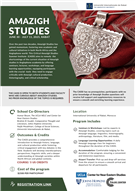Panel 1: Focus on Egypt
The conference panels were kicked off by a panel that used Egypt as a case-study, both in terms of understanding the dynamics of one particular uprising as well as thinking specifically about the pedagogical implications of that uprising on the teaching of Egyptian history and contemporary politics. Joel Beinin, in his presentation entitled "Workers and Egypt’s January 25th Revolution: Shifting the Discussion from Autocracy/Democracy to Political Economy and Equity," argued that a political economy approach is vital to understanding and talking about events that have been described as "the Egyptian revolution." For Beinin, the most significant dimension of opposition to the regime relates to the predations of Egyptian neoliberalism, one of the major milestones of which was the creation of a "government of businessmen" in July 2004. Opposition to neoliberal policies were an important center of pre-January 25 mobilizations as Egypt`s poor and working class have come to spend approximately eighty percent of their disposable income for food and other basic needs. Such dynamics spurred a steady rise in collective actions (protests, strikes, sit-ins, etc.) which formed an essential component of the repertoires drawn on after January 25th.

[Joel Beinin]
Jason Brownlee, in his presentation entitled "How the January 25th Uprising Is Reshaping the Norms of Egyptian Domestic and Foreign Policy,” offered a form of conceptualizing contemporary Egyptian politics that moves beyond the unsatisfactory regime-centered elitist analysis that dominated before January 25th. The alternative "pluralistic" model is made up of the following components: traditional elites connected to the ancien regime and the business community; electoral politics, which is dominated by a combination of religious conservatives and political entrepreneurs; and street politics, the Egyptians who go into the streets and participate in contentious politics. Such a framework, Brownlee argued, helps makes sense of dynamics such as the "asymmetric success" of liberal and leftist groups/constituencies, wherein they dominate public protests but have been unable to achieve more institutional forms of power and influence.

[Jason Brownlee]
Paul Sedra, in his presentation entitled "Egyptian History without Egypt? Privileging Pluralism in a Post-Revolution Pedagogy," took as his point of departure the powerful images of Muslims and Christians protecting each other during prayers in Tahrir Square. He highlighted the ways in which "national unity" is an ill fit for these cross-sectarian solidarities, especially in the light of the long (and regime-sponsored) discourse of "national unity." Sedra was critical of the tendency of scholarly attention to focus on the Coptic community only when the latter attracts Islamist attention. At the heart of his presentation, Sedra explored whether Egyptian nationalism (and studies of it) can accommodate a distinctly Coptic political culture.
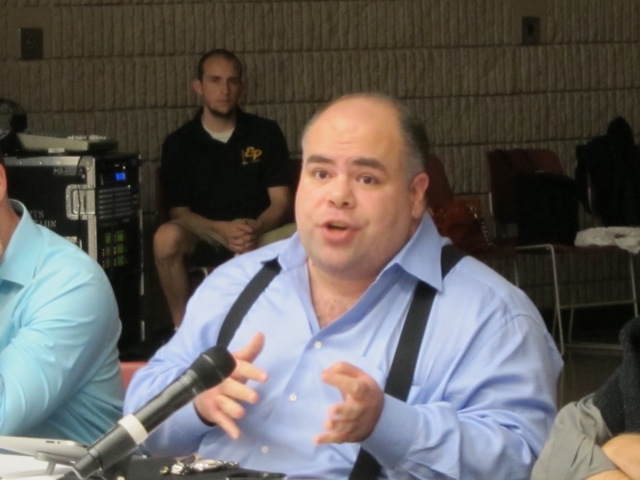
[Paul Sedra]
Paul Amar`s presentation, "How the Egyptian Revolution Teaches Political Sociology, Global Political Economy, Gender Studies, and Geopolitics," highlighted how the uprising has generated new images and narratives about Egyptians, Egypt, and the Middle East, thus providing a refreshing departure from — and repudiations of — exotic and terrorlogical semiotics. However, Amar attempted to push this further by advocating the positioning of Egypt (and the Middle East) as a point of "futurity," both regionally and globally, as contrasted with the backward-looking narratives that dominate academic discourse. He was particularly interested in exploring the ways in which Tahrir-modeled experiments in labor organizing are being implemented elsewhere in the region, as well as in the United States.
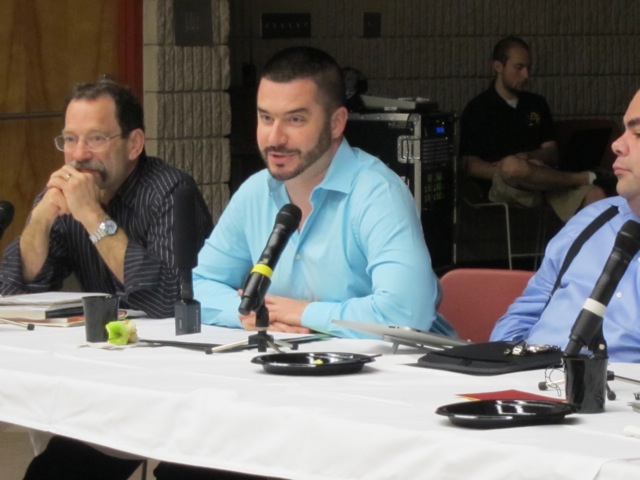
[Left to right: Joel Beinin, Paul Amar, Paul Sedra]
Peter Gran`s presentation, "Thoughts Out of Season," highlighted some of the more structural constraints facing undergraduate education. He began by stating that people who shape public opinion in the media shape student perspectives, which the latter bring into the classroom. Gran believes it is somewhat premature to draw conclusions about the transformations since January 25th, and instead suggested scholars not shy away from understanding the nature of, and strategizing about how to dismantle, the deeper structure at play in the minds of both students and colleagues.

[Peter Gran]
Panel 2: Knowledge Production and the Role of the Academic
The second panel sought to link knowledge production to social change and critically consider the role of the academic in the classroom and beyond. In "Producing Knowledge for Justice? Gender and Sexuality Studies and the Consumption of Arabs and Muslims," Rabab Abdulhadi tackled the issue of knowledge production and its potential relationship to the advancement of justice. She posed and discussed the question of whether the urgency of change in researching the Middle East, which has been expressed by some in the wake of the Arab uprisings, reflects a similar urgency in terms of classroom teaching. Abdulhadi went on to explore this question by highlighting the ways in which the Arab uprising provides a teaching moment about both our individual areas of expertise as well one about our students and their locality (i.e., also a teaching moment about American-ness).
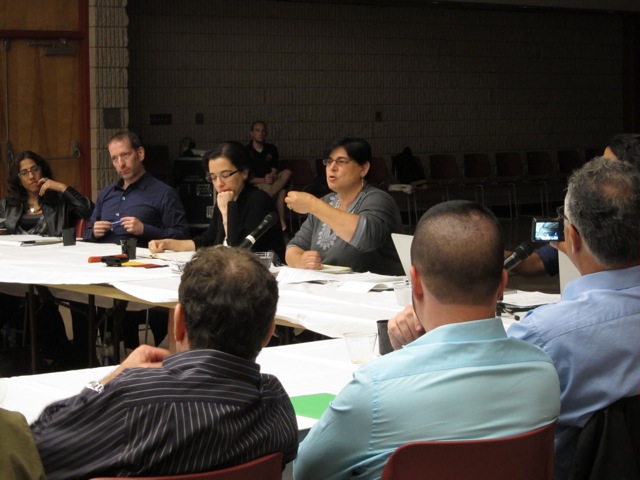
[Left to right: Nadine Naber, Anthony Alessandrini, Shiva Balaghi, Rabab Abdulhadi]
In "De-Orientalizing Pedagogy," Nadine Naber highlighted the ways in which Arab-American Studies is trapped between Orientalist and anti-Orientalist discourses. Accordingly, dominant trends tend to be shaped by long-distance nationalism, focusing so much on institutional power and government policies that human beings as subjects and agents disappear. Naber stressed the use of gender and queer theory to respond to this dilemma and to work our way out of an anti-Orientalist defensive posture that critiques government practices at the expense of critical and necessary discussion about agency.

[Nadine Naber]
Stephen Sheehi, in "The Social Relations in Islamophobia and the Role of the Academic," addressed both the issue of Islamophobia and the role of the educator. He argued that we need to view Islamophobia as an ideological formation that is historical in nature, deployed to perpetuate American empire. He stressed that the role of Middle East scholars as experts must include imagining themselves as transformative intellectuals and not simply scholars. In this sense, the call for critically interrogating Islamophobia is at once a call for critically interrogating our roles in educational institutions as part of a broader society implicated in empire, and a call for resistance to it.

[Left to right: Shiva Balaghi, Rabab Abdulhadi, Stephen Sheehi, Bassam Haddad]
Anthony Alessandrini`s presentation, "Pedagogical Uprisings: Teaching to the Unconverted, or Against Multiculturalism`s Middle East," addressed the issue of institutional multiculturalism and the ways it has become a mechanism for diversity management. He challenged the one-of-each-text model for teaching world literature or regional literature, linking this dilemma to broader questions of solidarity that go beyond merely expressing it to practicing it in the classroom.

[Left to right: Anthony Alessandrini, Shiva Balaghi, Rabab Abdulhadi, Stephen Sheehi]
Lunchtime Talk by Nir Rosen
Between the second and third panels, Nir Rosen presented a lunchtime talk, "A Critique of Reporting on the Middle East." A version of his talk can be found here.
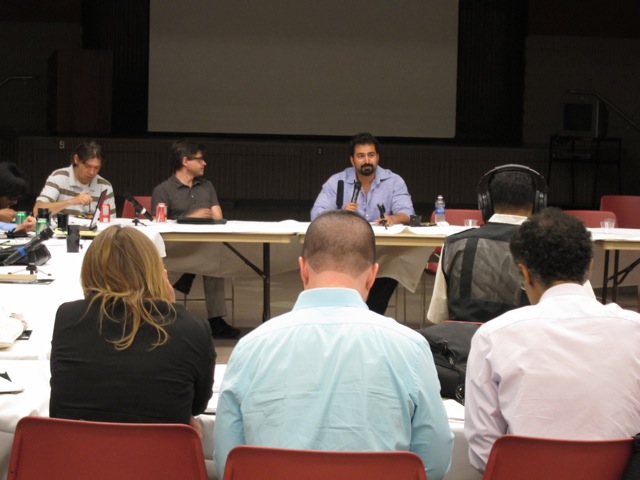
[Nir Rosen]
Panel 3: Reframing Analytical Narratives and Research Agendas
This panel sought to evaluate the ways in which the Arab uprisings give pause to the assumptions undergirding both teaching frameworks as well as research agendas. Cemil Aydin`s "Rescuing the History of Universalism and Modernity from the Eurocentric Decline Paradigm" highlighted the ways in which problematic coverage of the Arab uprisings is linked to previously dominant trends in Middle East historiography. Part of this, he argued, is to be found in Eurocentric understandings of history where global values such as liberty and democracy are traced back to modern Europe. Aydin also argued that this is related to larger organicist civilizational discourse of the decline of the East and the rise of the West. Another part of this paradigm is the persistent misconception of an alleged misfit between Muslims and secularism.
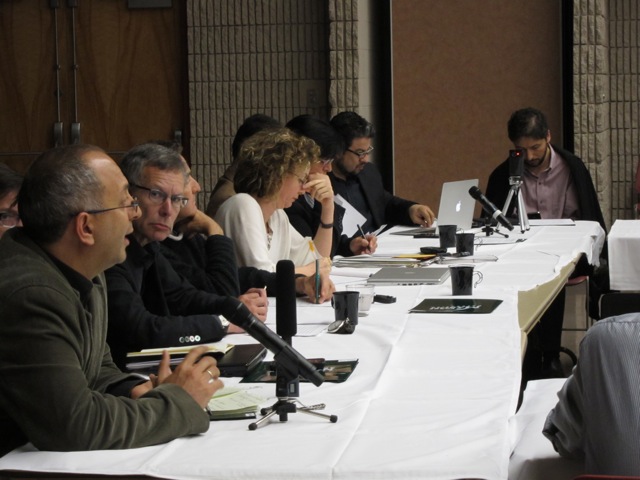
[Left to right: Cemil Aydin, James Gelvin, Zachary Lockman, Nadya Sbaiti]
In her presentation, “Disoriented: Rethinking Middle East, Far West, and the Points in Between,” Nadya Sbaiti provided examples of how hard it is to teach Middle East survey courses and be satisfied with what students take away in the end. One of these take-aways, according to Sbaiti, invariably ends up being the understanding that the West acts and the East reacts. This occurs almost irrespective of how syllabi are organized (chronologically, thematically, etc.). Despite all attempts to complicate historical narratives, the West in one way or another emerges as the point of reference. For Sbaiti, the opportunity presented by the revolutions is to rethink what exactly constitutes a historical event, moving away from the interactions with the West as exclusively defining moments.
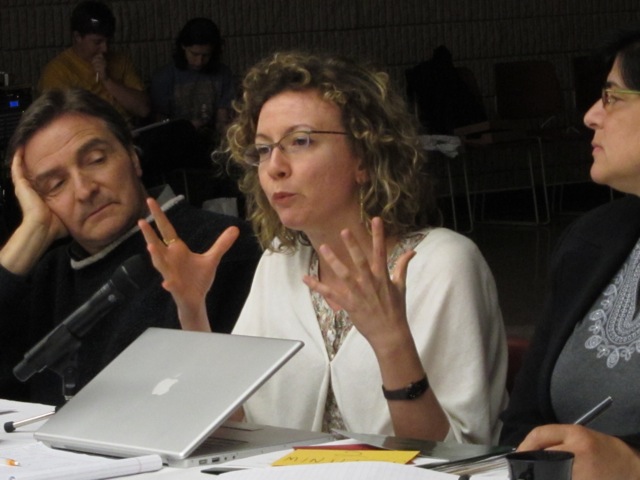
[Left to right: Zachary Lockman, Nadya Sbaiti, Rabab Abdulhadi]
Pete Moore`s "Back to Basics in Political Economy: Power and Inequality" argued that the Arab uprisings are an opportunity to get back to basics: power and inequality. He probed which political economy frameworks can help understand uprisings within these two related concepts, and drew on Karl Polanyi`s notion of the free market as "alien to human society" to make some interjections about the dynamics underlying the uprisings and what led up to them.

[Pete Moore]
In "Rethinking the Big Picture: Narrative Middle Eastern History in the Wake of the Arab Uprisings, 1944-Present," James Gelvin highlighted the challenge of creating a framework to make sense of post-World War II history beyond simply listing a sequence of events. He discussed various iterations, but arrived at one where a "civic order" comes into place a result of a confluence of factors, such that various events can be understood as struggles around/within that civic order. This, he argues, allows for the incorporation of three thematic discussions that can be related but are also independent spheres of inquiry: authoritarian state building; U.S. policy; and resistance to local and external forces.

[Left to right: Pete Moore, James Gelvin, Zachary Lockman]
Hesham Sallam`s "Challenges and Tradeoffs in Moving Beyond Dominant Approaches to the Study of the Comparative Politics of the Middle East" identified tough challenges to move beyond a defensive mode of teaching. In political science courses, Sallam argued, we tend to take cues from theories that stand on shaky ground. By the time an instructor is finished demolishing problematic theories, the semester is over, and consequently the instructor and students have spent more time talking about what Middle East politics is not, and less about what Middle East politics actually is.
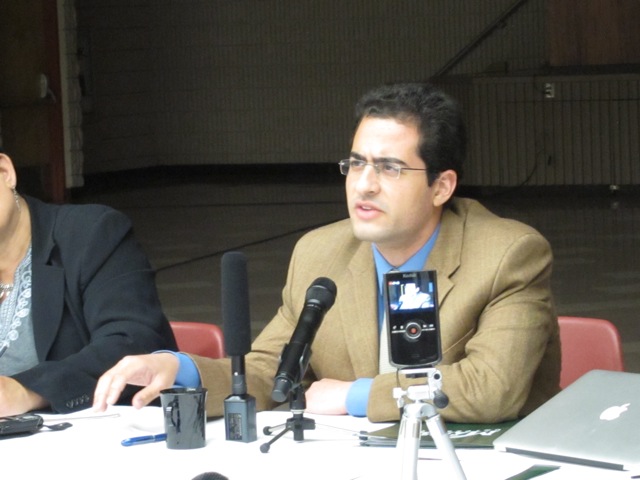
[Hesham Sallam]
In "Making Connections," Zachary Lockman reminded us that students do not come to class as blank slates. Thus, for him, the first task of a course is that it help students to adopt a critical attitude. Lockman argued that it is worth thinking about intersections we can exploit usefully, between what happens in the Middle East (initially distant and unknown) and students` own lives (in the United States). He highlighted how the lives of our students are shaped by the same neoliberal agenda that is shaping the lives of the people in the Middle East, and thus the ways in which it makes sense to critically locate them (all of us) in the same social time and space.

[Zachary Lockman]
Panel 4: Bringing the Middle East into the Fields of Law and Theory
The fourth panel of the conference sought to consider the ways in which the teaching of law in the Middle East has been affected by the Arab uprisings, as well as the relationship of the Arab world to this broader project, both political and academic. Noura Erakat, in "Problematics of Teaching International Law in the Contemporary Middle East," drew attention to how the Arab uprisings have facilitated the teaching of international law and human rights in the Middle East, specifically in that claims made by people were less claims exclusively vis-à-vis their state and more claims of human dignity vis-à-vis broader notions of rights. For Erakat, scenes of regimes deploying military force against unarmed protesters have complicated, though not eliminated, the exceptionality of Israel`s violence vis-à-vis discussions of international law. In this sense, authoritarian regimes and occupying regimes resort to the same type of violence, and this recently displayed symmetry has forced some to question what otherwise was a discourse that was permissive of Israel`s actions.
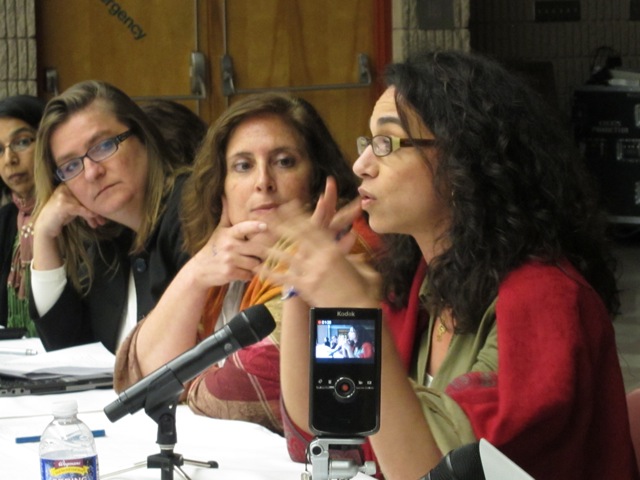
[Left to right: Sumaiya Hamdani, Agnieszka Paczynska, Lisa Hajjar, Noura Erakat]
In "Following the Torture Trail from Middle East Studies to American Studies," Lisa Hajjar pointed out the centrality of torture in the way we think about the Arab uprisings, authoritarian regimes, and the United States. For her, the practice of torture says something significant about the nature of the regime, and we have to understand that there is no such thing as a liberal torturing state. To torture, for Hajjar, is by definition to be illiberal.

[Left to right: Agnieszka Paczynska, Nadine Naber, Lisa Hajjar]
Agnieszka Paczynska, in "Teaching the Middle East in Theory Courses," provided examples of the ways in which the Arab uprisings offer an opportunity for students in interdisciplinary and cross-regional studies to think of the Middle East through lenses other than those of Islam or oil.

[Left to right: Sumaiya Hamdani, Nadine Naber, Agnieszka Paczynska, Lisa Hajjar]
In "Who`s Afraid of Iran? Neocons` Enduring Influence on US Policy Analysis," Shiva Balaghi highlighted the persistence of the "Iran Question" in the face of developments in the Arab world in U.S. policy circles. She argued that the issues of Arab nationalisms, as well as secular opposition movements, have been removed from the equation in favor of a broader notion of a Sunni vs. Shia struggle. Within context of Neo-Conservatives’ advocacy of war on Iran, for Balaghi, the question that keeps presenting itself is who will attack Iran, as opposed to whether Iran will be attacked.

[Left to right: Shiva Balaghi, Nadine Naber, Agnieszka Paczynska, Noura Erakat]
In "Teaching Islam after the Revolution," Sumaiya Hamdani discussed pedagogical approaches to teaching courses dealing with Islam in the contemporary context, as well as the sorts of challenges traditionally to be found in teaching this topic. Among the questions she raised were how to teach students to regard the "soundtrack" of the recent revolutions: for example, how to understand the role of Friday prayers, which have often been followed by protests with an avowedly secular underpinning, or how to think about images of prayer in the protests as part of larger multiconfessional actions and movements. Hamdani also discussed approaches to teaching the history of Islam without separating the past from the present and thus turning the past into "a foreign country."
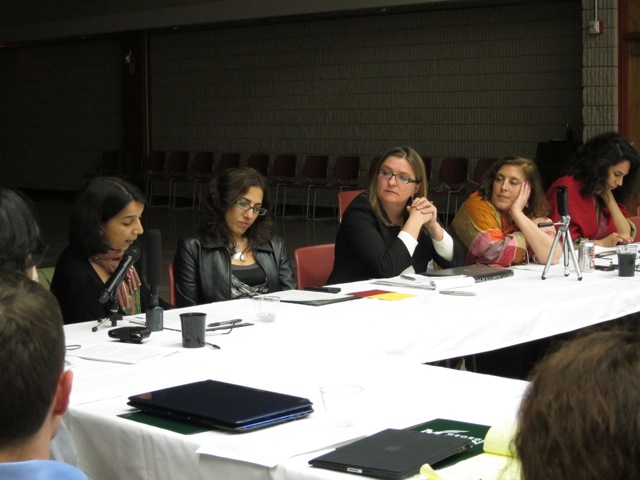
[Left to right: Sumaiya Hamdani, Nadine Naber, Agnieszka Paczynska, Lisa Hajjar, Noura Erakat]
We at Jadaliyya, along with Arab Studies Journal, would like to extend our sincere appreciation to the Ali Vurak Ak Center for Global Islamic Studies and the Middle East Program, both at George Mason University, without who`s financial and logistical support, the conference would not have been possible.
Click here for the Introduction to Jadaliyya`s "Teaching the Middle East" conference.
Click here for Panel Summaries of Day 1 of Jadaliyya`s "Teaching the Middle East" conference.
Click here for Conclusions of Jadaliyya`s "Teaching the Middle East" conference.
![[Image from Jadaliyya archive.]](https://kms.jadaliyya.com/Images/357x383xo/dayone.jpg)

